Resume
Attending Physician Cover Letter Examples

May 29, 2025
|
12 min read
Craft a compelling attending physician cover letter to heal any job application woes. Gain insights, tips, and practical advice to ensure your letter stands out from the rest. Stitch together words that capture your medical expertise.
4.70 Average rating
Rated by 348 people
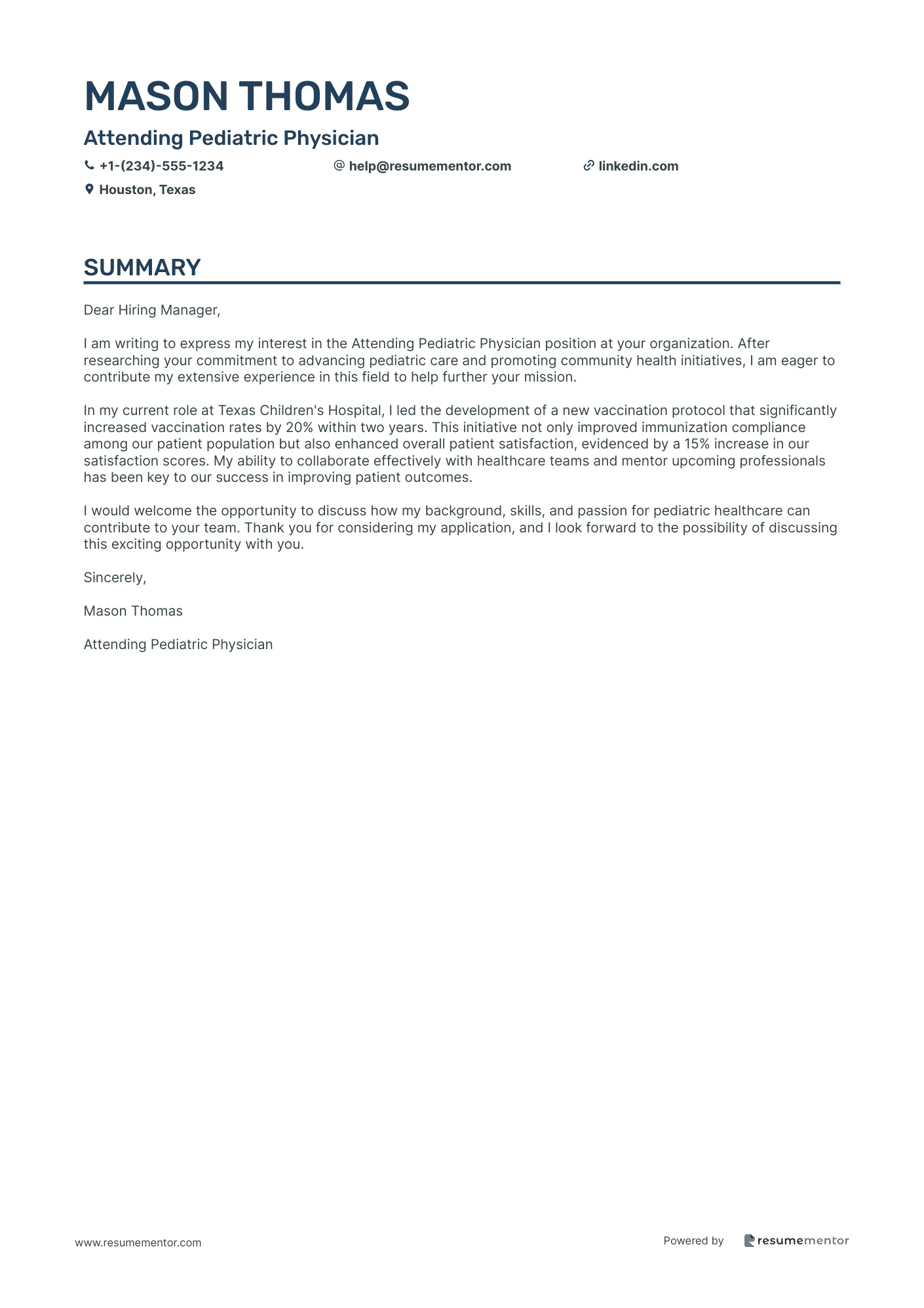
Attending Pediatric Physician
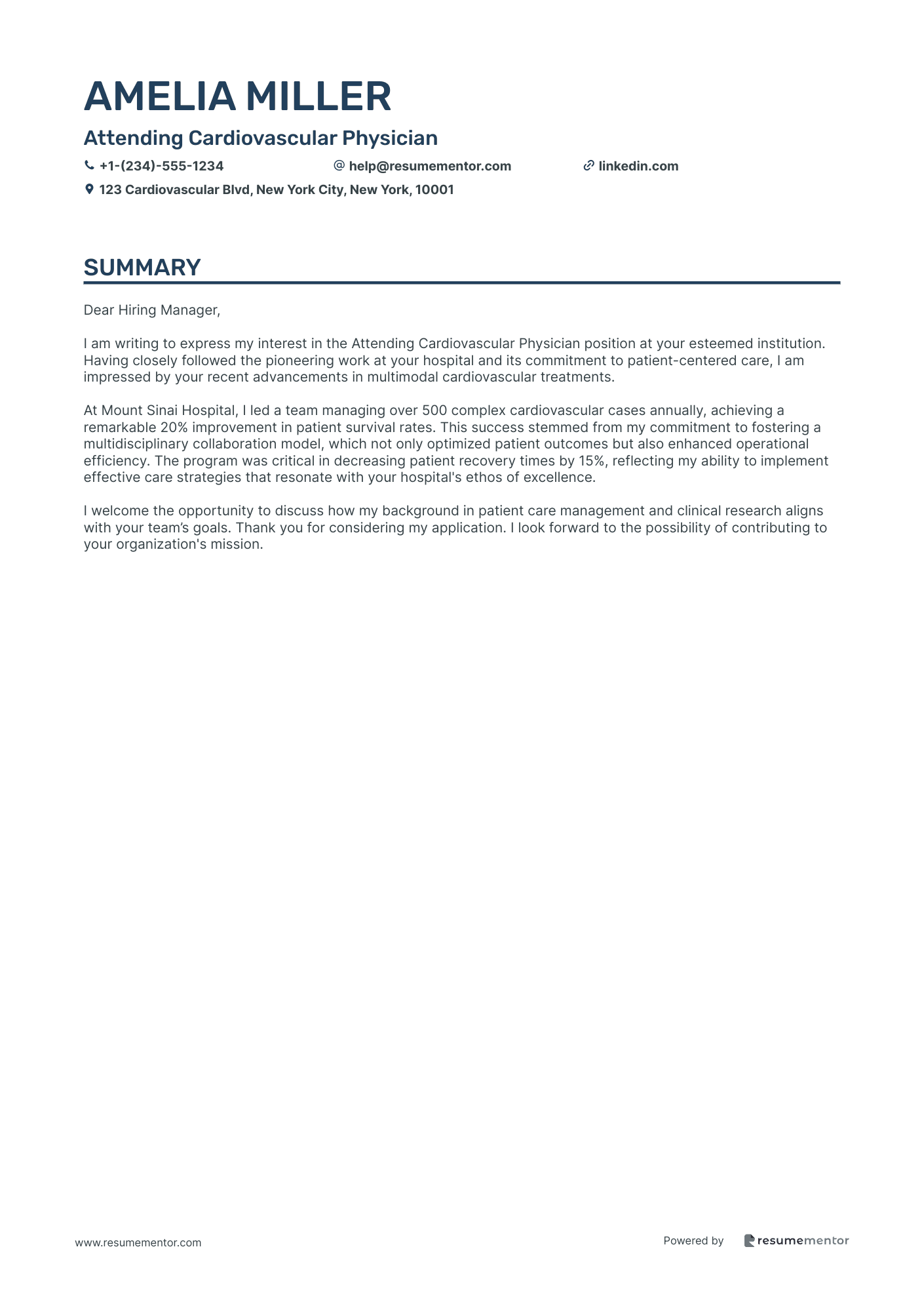
Attending Cardiovascular Physician
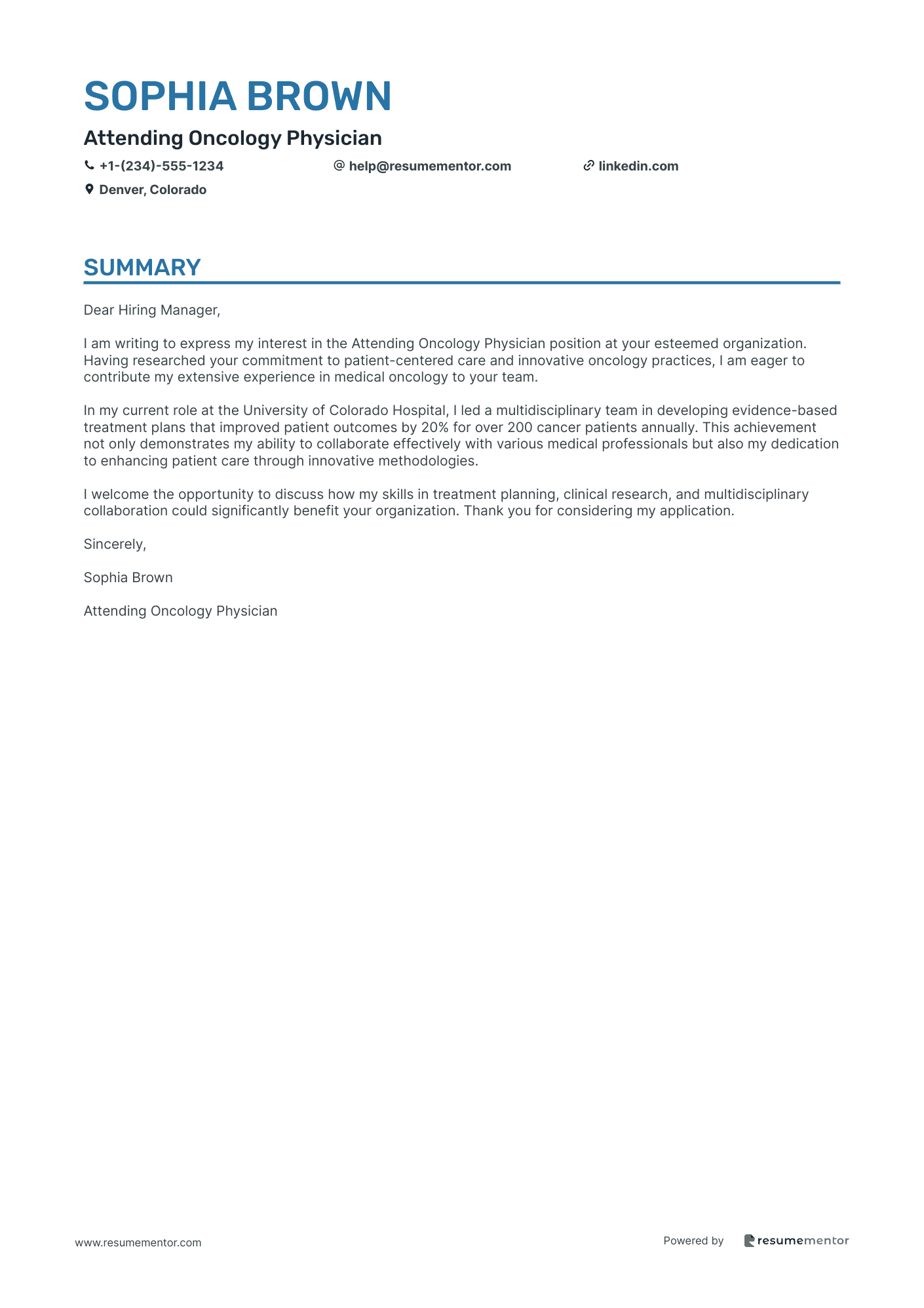
Attending Oncology Physician
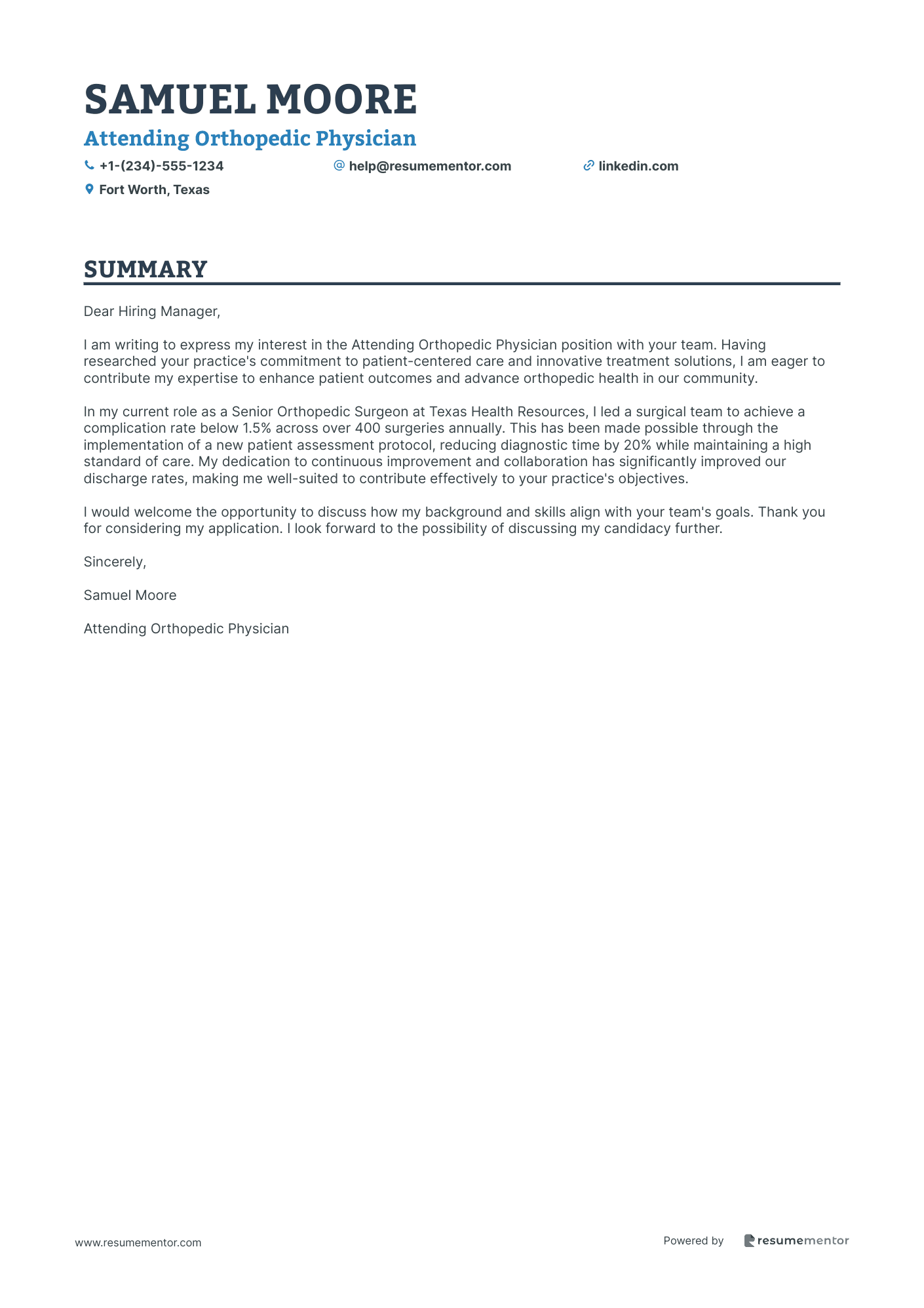
Attending Orthopedic Physician
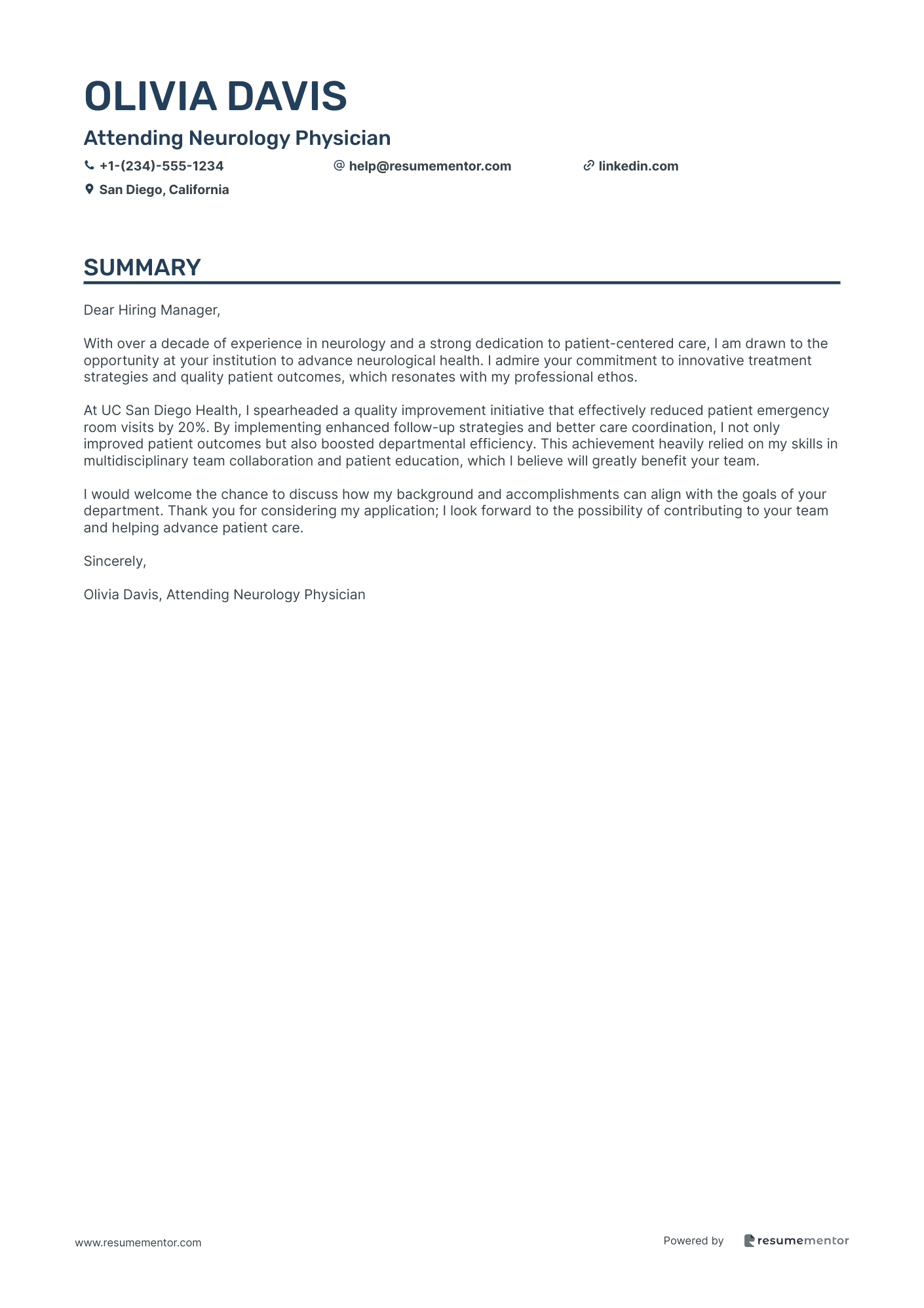
Attending Neurology Physician
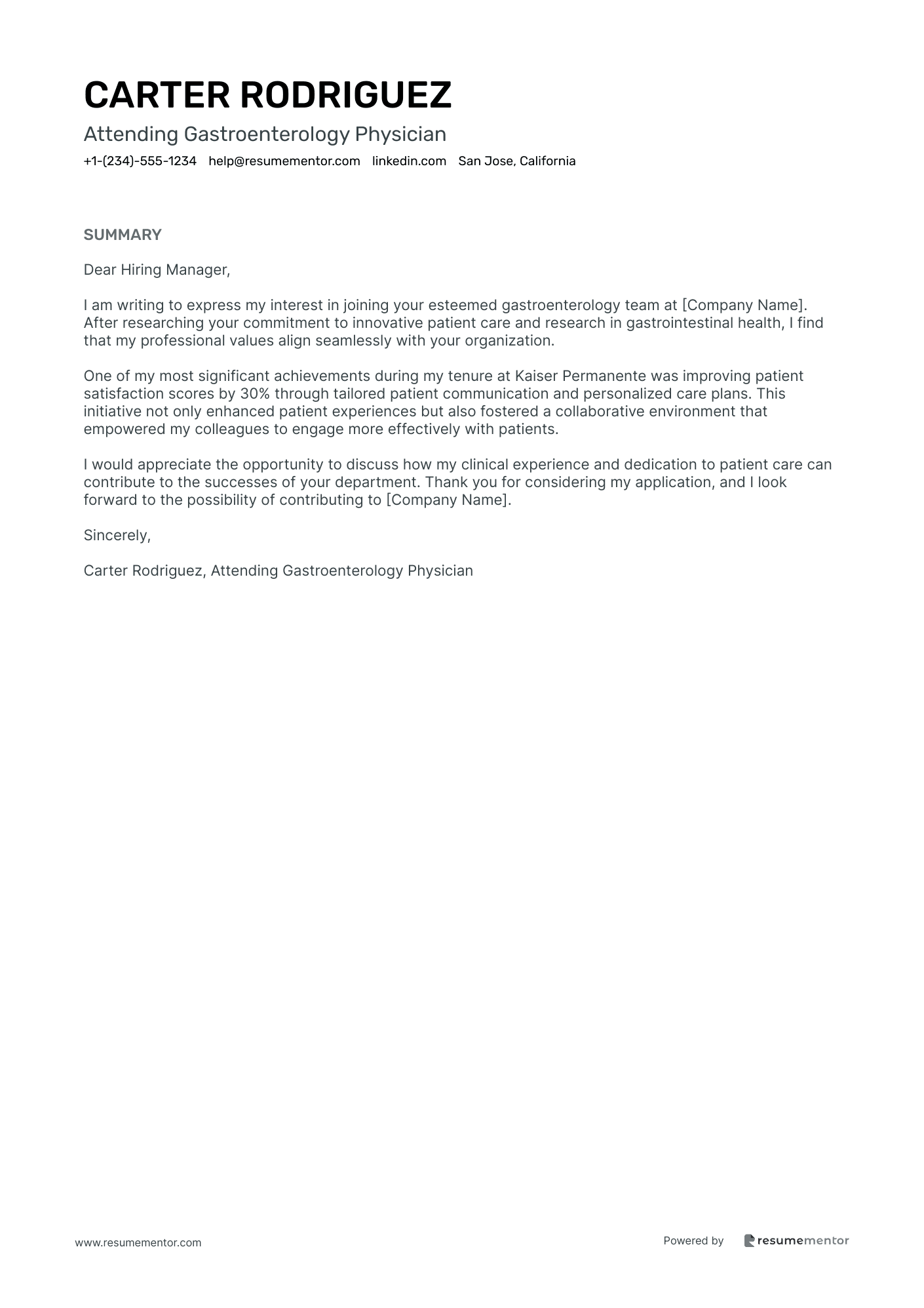
Attending Gastroenterology Physician
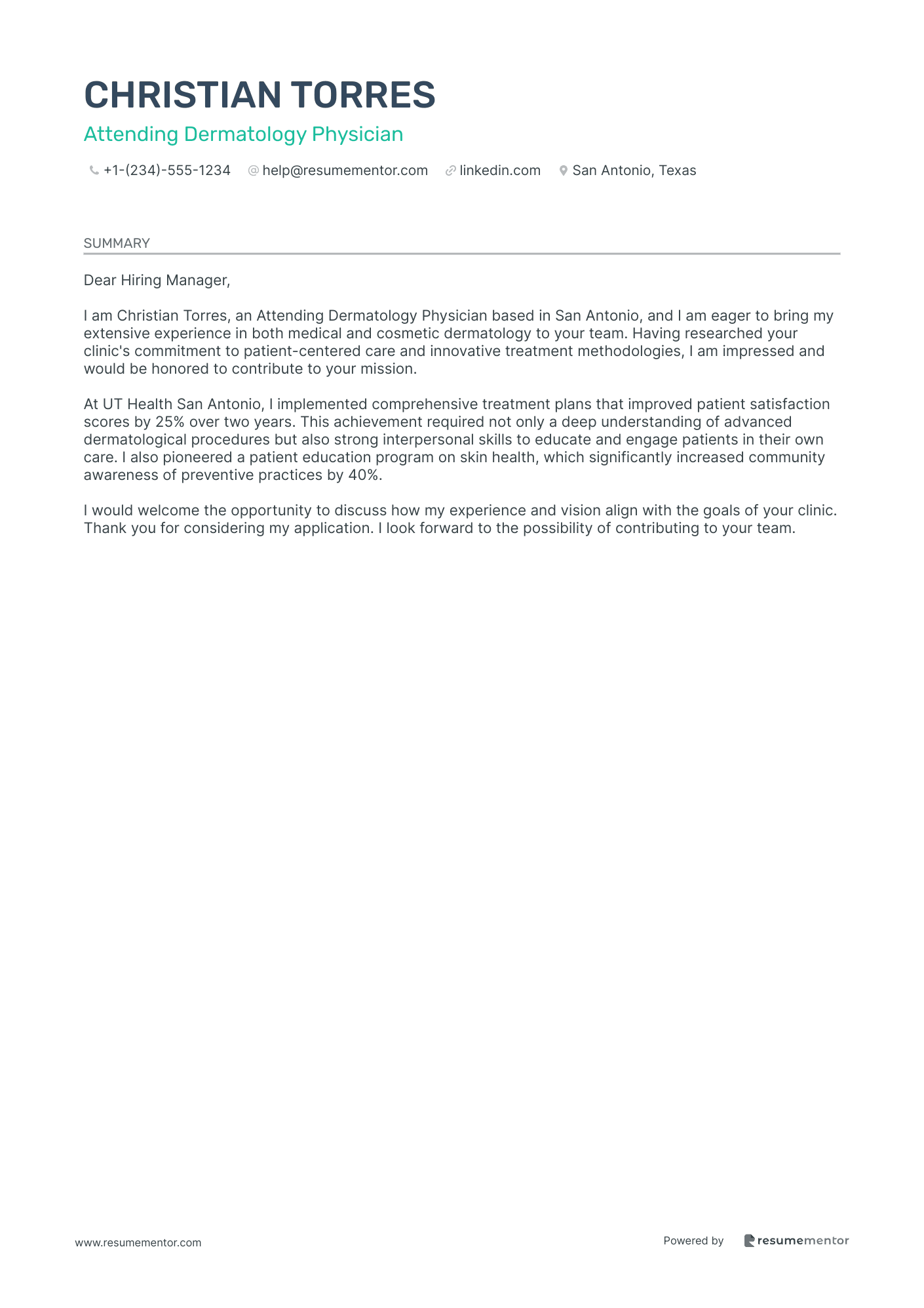
Attending Dermatology Physician
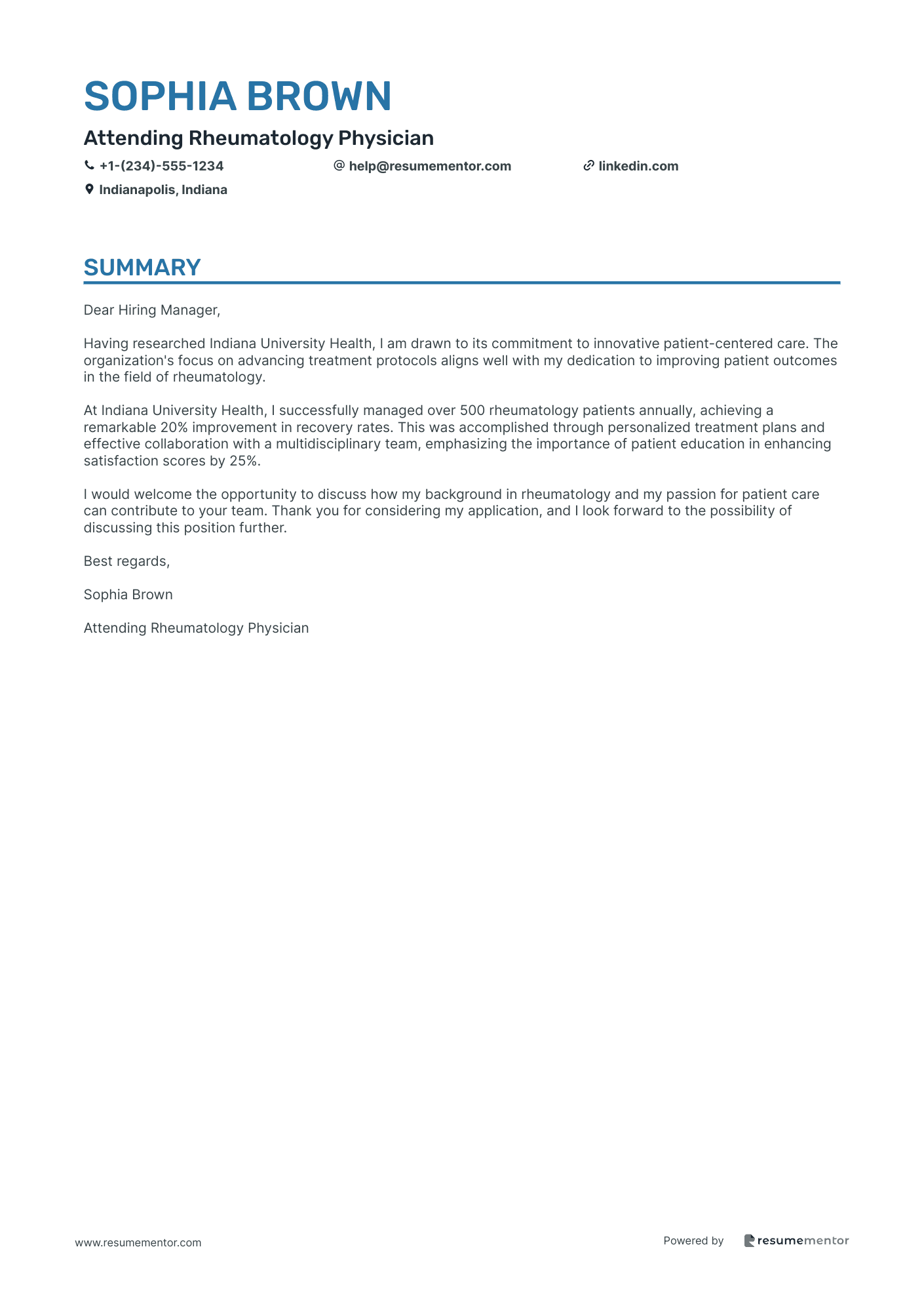
Attending Rheumatology Physician
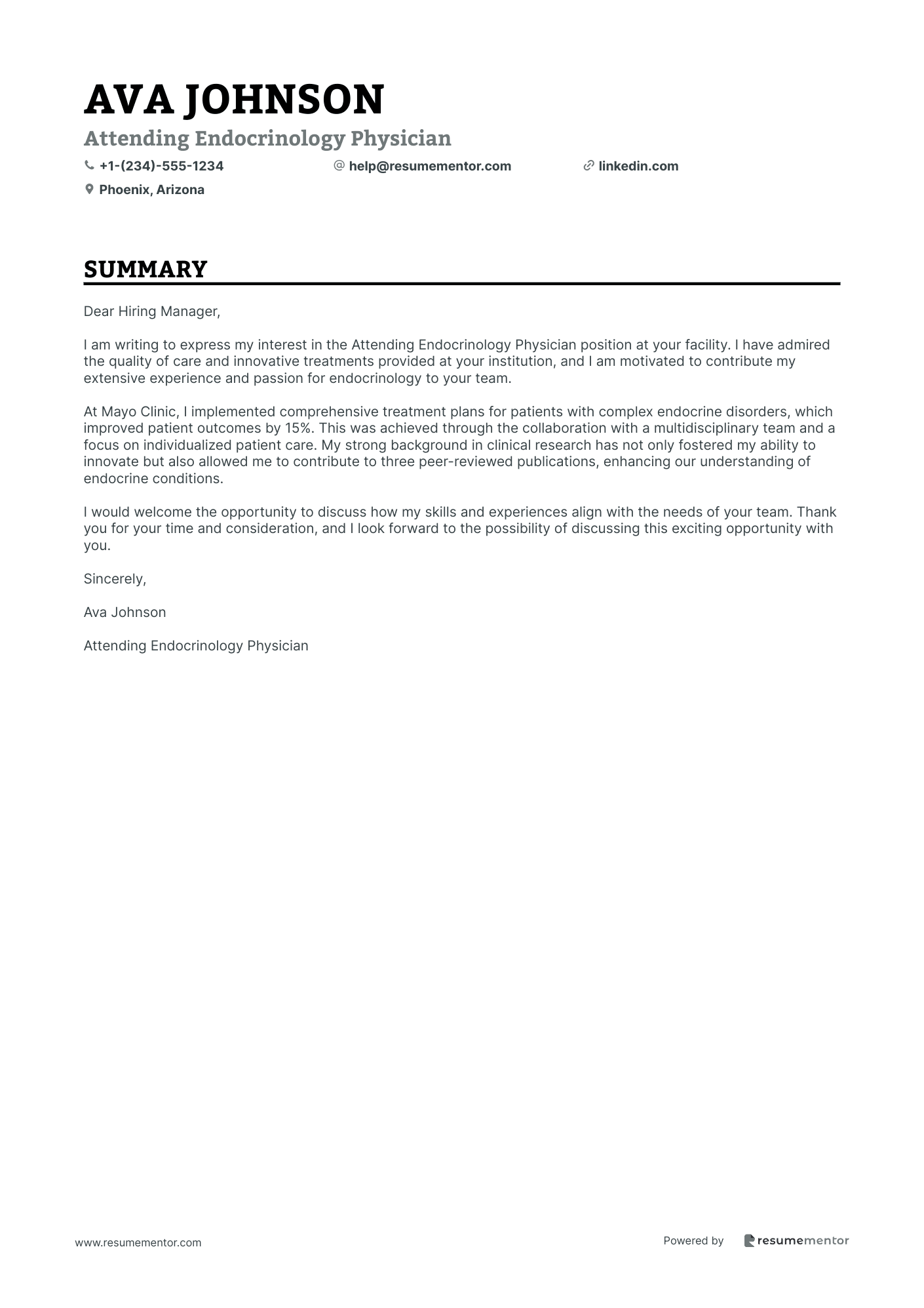
Attending Endocrinology Physician
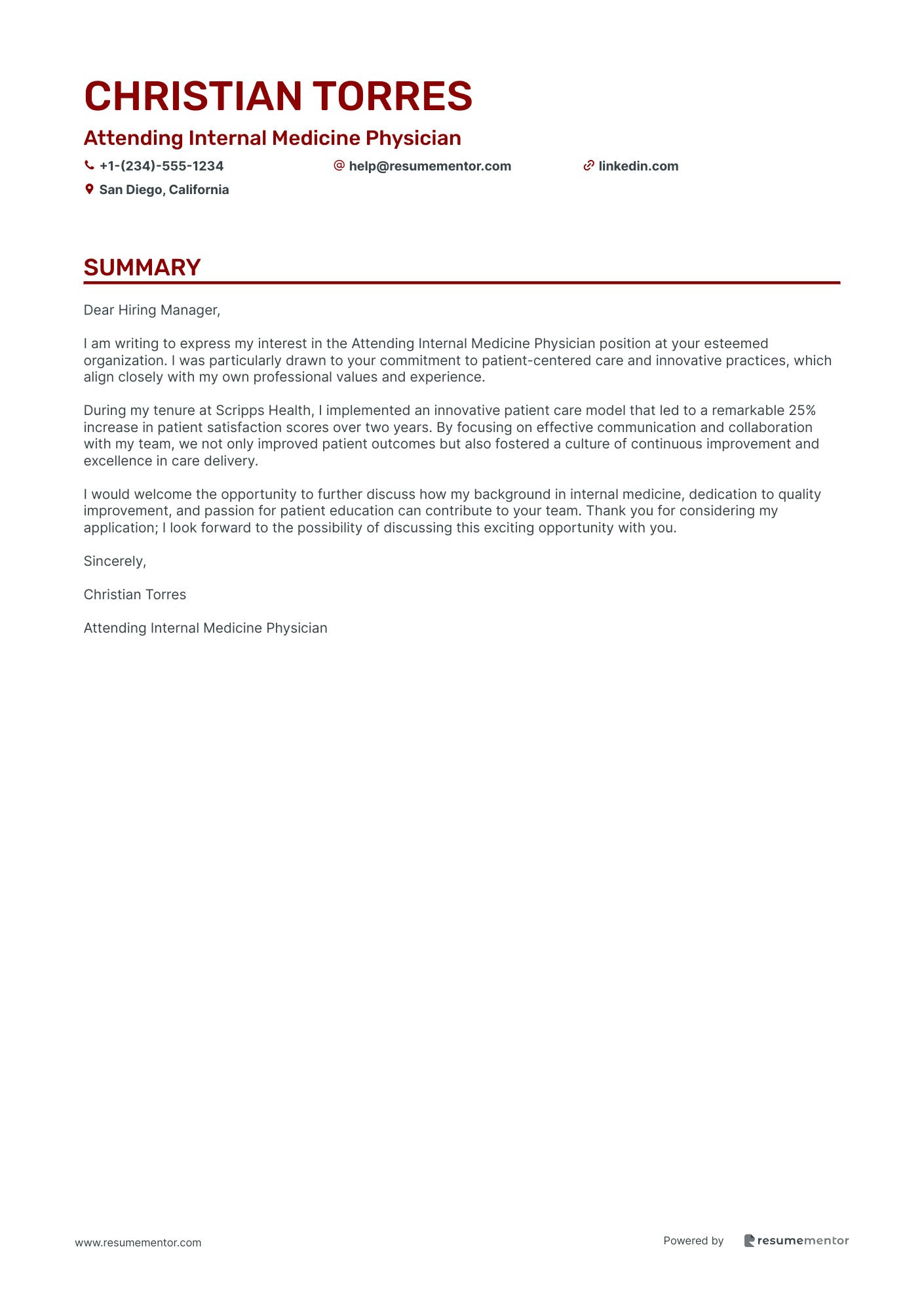
Attending Internal Medicine Physician

Attending Pediatric Physician cover letter sample
When applying for this position, emphasize any pediatric clinical experience, particularly in acute care settings. Highlight your certifications like Pediatric Advanced Life Support (PALS) and any relevant fellowships. It's important to discuss your ability to communicate effectively with both children and their parents, showcasing empathy and clarity. Provide specific examples of how you've handled challenging cases, using the 'skill-action-result' approach to illustrate your impact on patient outcomes. Mention any involvement in community health initiatives that demonstrate your commitment to improving children's health.
Mason Thomas
Attending Pediatric Physician
Summary
Dear Hiring Manager,
I am writing to express my interest in the Attending Pediatric Physician position at your organization. After researching your commitment to advancing pediatric care and promoting community health initiatives, I am eager to contribute my extensive experience in this field to help further your mission.
In my current role at Texas Children's Hospital, I led the development of a new vaccination protocol that significantly increased vaccination rates by 20% within two years. This initiative not only improved immunization compliance among our patient population but also enhanced overall patient satisfaction, evidenced by a 15% increase in our satisfaction scores. My ability to collaborate effectively with healthcare teams and mentor upcoming professionals has been key to our success in improving patient outcomes.
I would welcome the opportunity to discuss how my background, skills, and passion for pediatric healthcare can contribute to your team. Thank you for considering my application, and I look forward to the possibility of discussing this exciting opportunity with you.
Sincerely,
Mason Thomas
Attending Pediatric Physician
Attending Cardiovascular Physician cover letter sample
When applying for this position, it’s important to showcase your clinical experience, especially in cardiology or related fields. Highlight your familiarity with diagnostic tools and treatment protocols. If you have attended workshops or earned certifications in cardiovascular health, make sure to mention these, specifying your learning outcomes. Sharing anecdotes about patient care or successful treatment plans demonstrates your ability to make informed decisions. Emphasize your teamwork experience with other healthcare professionals, as collaboration is key in delivering quality patient care.
Amelia Miller
Attending Cardiovascular Physician
+1-(234)-555-1234
help@resumementor.com
123 Cardiovascular Blvd, New York City, New York, 10001
Summary
Dear Hiring Manager,
I am writing to express my interest in the Attending Cardiovascular Physician position at your esteemed institution. Having closely followed the pioneering work at your hospital and its commitment to patient-centered care, I am impressed by your recent advancements in multimodal cardiovascular treatments.
At Mount Sinai Hospital, I led a team managing over 500 complex cardiovascular cases annually, achieving a remarkable 20% improvement in patient survival rates. This success stemmed from my commitment to fostering a multidisciplinary collaboration model, which not only optimized patient outcomes but also enhanced operational efficiency. The program was critical in decreasing patient recovery times by 15%, reflecting my ability to implement effective care strategies that resonate with your hospital's ethos of excellence.
I welcome the opportunity to discuss how my background in patient care management and clinical research aligns with your team’s goals. Thank you for considering my application. I look forward to the possibility of contributing to your organization's mission.
Attending Oncology Physician cover letter sample
When applying for this role, it's important to showcase your clinical experience in oncology. Highlight any specific treatments or procedures you have performed, as well as any research you've been involved in. Mention your ability to communicate complex information to patients and their families, emphasizing empathetic patient care. If you have participated in multidisciplinary teams, provide examples of how collaboration improved patient outcomes. Include any relevant certifications or fellowships, along with metrics that reflect your success in managing patient care and treatment plans effectively.
Sophia Brown
Attending Oncology Physician
Summary
Dear Hiring Manager,
I am writing to express my interest in the Attending Oncology Physician position at your esteemed organization. Having researched your commitment to patient-centered care and innovative oncology practices, I am eager to contribute my extensive experience in medical oncology to your team.
In my current role at the University of Colorado Hospital, I led a multidisciplinary team in developing evidence-based treatment plans that improved patient outcomes by 20% for over 200 cancer patients annually. This achievement not only demonstrates my ability to collaborate effectively with various medical professionals but also my dedication to enhancing patient care through innovative methodologies.
I welcome the opportunity to discuss how my skills in treatment planning, clinical research, and multidisciplinary collaboration could significantly benefit your organization. Thank you for considering my application.
Sincerely,
Sophia Brown
Attending Oncology Physician
Attending Orthopedic Physician cover letter sample
When applying for this role, emphasize any clinical experience you have in orthopedic settings. Highlight your proficiency in interpreting imaging studies and assisting in surgeries, as these skills are essential. If you have completed specialized training or certifications in musculoskeletal care, be sure to mention these, along with the duration. Provide specific examples of how your support improved patient outcomes or surgical efficiency, using a 'skill-action-result' approach. This will demonstrate your value and readiness to contribute effectively in a clinical environment.
Samuel Moore
Attending Orthopedic Physician
Summary
Dear Hiring Manager,
I am writing to express my interest in the Attending Orthopedic Physician position with your team. Having researched your practice's commitment to patient-centered care and innovative treatment solutions, I am eager to contribute my expertise to enhance patient outcomes and advance orthopedic health in our community.
In my current role as a Senior Orthopedic Surgeon at Texas Health Resources, I led a surgical team to achieve a complication rate below 1.5% across over 400 surgeries annually. This has been made possible through the implementation of a new patient assessment protocol, reducing diagnostic time by 20% while maintaining a high standard of care. My dedication to continuous improvement and collaboration has significantly improved our discharge rates, making me well-suited to contribute effectively to your practice's objectives.
I would welcome the opportunity to discuss how my background and skills align with your team's goals. Thank you for considering my application. I look forward to the possibility of discussing my candidacy further.
Sincerely,
Samuel Moore
Attending Orthopedic Physician
Attending Neurology Physician cover letter sample
In your cover letter, highlight any previous experience in neurology or related fields. Emphasize your clinical skills, including patient assessments and neurologic examinations. Mention any relevant training or certifications, such as Advanced Cardiac Life Support (ACLS) or residency programs, as these demonstrate your commitment to the specialty. Provide examples of how your patient-centered approach has led to improved diagnoses or treatment outcomes. Use specific metrics or patient stories to demonstrate how your contributions have positively impacted healthcare delivery in your past roles.
Olivia Davis
Attending Neurology Physician
Summary
Dear Hiring Manager,
With over a decade of experience in neurology and a strong dedication to patient-centered care, I am drawn to the opportunity at your institution to advance neurological health. I admire your commitment to innovative treatment strategies and quality patient outcomes, which resonates with my professional ethos.
At UC San Diego Health, I spearheaded a quality improvement initiative that effectively reduced patient emergency room visits by 20%. By implementing enhanced follow-up strategies and better care coordination, I not only improved patient outcomes but also boosted departmental efficiency. This achievement heavily relied on my skills in multidisciplinary team collaboration and patient education, which I believe will greatly benefit your team.
I would welcome the chance to discuss how my background and accomplishments can align with the goals of your department. Thank you for considering my application; I look forward to the possibility of contributing to your team and helping advance patient care.
Sincerely,
Olivia Davis, Attending Neurology Physician
Attending Gastroenterology Physician cover letter sample
When applying for this position, highlight your clinical experience in gastroenterology, including any relevant rotations or fellowships. Emphasize your familiarity with diagnostic procedures like endoscopies or colonoscopies. If you have participated in research or published papers on gastrointestinal topics, include these details to underscore your expertise. It's important to showcase your ability to work in a team and communicate effectively with both patients and medical staff. Use specific examples of how your excellent patient care has led to improved outcomes or increased patient satisfaction.
Carter Rodriguez
Attending Gastroenterology Physician
Summary
Dear Hiring Manager,
I am writing to express my interest in joining your esteemed gastroenterology team at [Company Name]. After researching your commitment to innovative patient care and research in gastrointestinal health, I find that my professional values align seamlessly with your organization.
One of my most significant achievements during my tenure at Kaiser Permanente was improving patient satisfaction scores by 30% through tailored patient communication and personalized care plans. This initiative not only enhanced patient experiences but also fostered a collaborative environment that empowered my colleagues to engage more effectively with patients.
I would appreciate the opportunity to discuss how my clinical experience and dedication to patient care can contribute to the successes of your department. Thank you for considering my application, and I look forward to the possibility of contributing to [Company Name].
Sincerely,
Carter Rodriguez, Attending Gastroenterology Physician
Attending Dermatology Physician cover letter sample
When crafting your cover letter, focus on your clinical experience in dermatology and any relevant training you have received. Highlight your familiarity with skin conditions and treatments, as well as any specialized skills like performing biopsies or cosmetic procedures. Mention your ability to build rapport with patients and your commitment to providing excellent care. Include examples of how you have managed treatment plans and improved patient outcomes. Demonstrating your teamwork in multidisciplinary settings can also strengthen your application.
Christian Torres
Attending Dermatology Physician
Summary
Dear Hiring Manager,
I am Christian Torres, an Attending Dermatology Physician based in San Antonio, and I am eager to bring my extensive experience in both medical and cosmetic dermatology to your team. Having researched your clinic's commitment to patient-centered care and innovative treatment methodologies, I am impressed and would be honored to contribute to your mission.
At UT Health San Antonio, I implemented comprehensive treatment plans that improved patient satisfaction scores by 25% over two years. This achievement required not only a deep understanding of advanced dermatological procedures but also strong interpersonal skills to educate and engage patients in their own care. I also pioneered a patient education program on skin health, which significantly increased community awareness of preventive practices by 40%.
I would welcome the opportunity to discuss how my experience and vision align with the goals of your clinic. Thank you for considering my application. I look forward to the possibility of contributing to your team.
Attending Rheumatology Physician cover letter sample
In your cover letter, emphasize any prior experience in managing chronic illnesses, particularly autoimmune conditions. Highlight your proficiency in patient assessment and management, including the use of disease-modifying therapies. Showcase your strong communication skills, especially in educating patients about their conditions and treatment options. Mention any relevant certifications or training, such as continuing medical education in rheumatology. Provide examples of how your interventions have improved patient outcomes, using the 'skill-action-result' approach to demonstrate your impact on care and overall patient satisfaction.
Sophia Brown
Attending Rheumatology Physician
Summary
Dear Hiring Manager,
Having researched Indiana University Health, I am drawn to its commitment to innovative patient-centered care. The organization's focus on advancing treatment protocols aligns well with my dedication to improving patient outcomes in the field of rheumatology.
At Indiana University Health, I successfully managed over 500 rheumatology patients annually, achieving a remarkable 20% improvement in recovery rates. This was accomplished through personalized treatment plans and effective collaboration with a multidisciplinary team, emphasizing the importance of patient education in enhancing satisfaction scores by 25%.
I would welcome the opportunity to discuss how my background in rheumatology and my passion for patient care can contribute to your team. Thank you for considering my application, and I look forward to the possibility of discussing this position further.
Best regards,
Sophia Brown
Attending Rheumatology Physician
Attending Endocrinology Physician cover letter sample
When applying for this position, it's important to showcase any prior experience in managing chronic conditions like diabetes and thyroid disorders. Highlight your proficiency in interpreting lab results and developing patient-centered treatment plans. If you have completed specialized training or fellowships in endocrinology, make sure to mention them. Additionally, provide specific instances where your clinical skills improved patient outcomes or satisfaction, using a 'skill-action-result' format. This will demonstrate your capability and commitment to improving patient health in your cover letter.
Ava Johnson
Attending Endocrinology Physician
Summary
Dear Hiring Manager,
I am writing to express my interest in the Attending Endocrinology Physician position at your facility. I have admired the quality of care and innovative treatments provided at your institution, and I am motivated to contribute my extensive experience and passion for endocrinology to your team.
At Mayo Clinic, I implemented comprehensive treatment plans for patients with complex endocrine disorders, which improved patient outcomes by 15%. This was achieved through the collaboration with a multidisciplinary team and a focus on individualized patient care. My strong background in clinical research has not only fostered my ability to innovate but also allowed me to contribute to three peer-reviewed publications, enhancing our understanding of endocrine conditions.
I would welcome the opportunity to discuss how my skills and experiences align with the needs of your team. Thank you for your time and consideration, and I look forward to the possibility of discussing this exciting opportunity with you.
Sincerely,
Ava Johnson
Attending Endocrinology Physician
Attending Internal Medicine Physician cover letter sample
When applying for this position, focus on showcasing your clinical experience and any specialized training in areas like chronic disease management. Highlight your ability to create personalized treatment plans and your proficiency in using electronic medical records. Include any research or publications that demonstrate your commitment to evidence-based practice. Also, mention interpersonal skills that improve patient relationships, like empathy and active listening. Use specific examples to illustrate how your interventions have led to improved patient outcomes, emphasizing measurable results.
Christian Torres
Attending Internal Medicine Physician
Summary
Dear Hiring Manager,
I am writing to express my interest in the Attending Internal Medicine Physician position at your esteemed organization. I was particularly drawn to your commitment to patient-centered care and innovative practices, which align closely with my own professional values and experience.
During my tenure at Scripps Health, I implemented an innovative patient care model that led to a remarkable 25% increase in patient satisfaction scores over two years. By focusing on effective communication and collaboration with my team, we not only improved patient outcomes but also fostered a culture of continuous improvement and excellence in care delivery.
I would welcome the opportunity to further discuss how my background in internal medicine, dedication to quality improvement, and passion for patient education can contribute to your team. Thank you for considering my application; I look forward to the possibility of discussing this exciting opportunity with you.
Sincerely,
Christian Torres
Attending Internal Medicine Physician
Related Articles

Continue Reading
Check more recommended readings to get the job of your dreams.
Resume
Resources
Tools
© 2026. All rights reserved.
Made with love by people who care.
